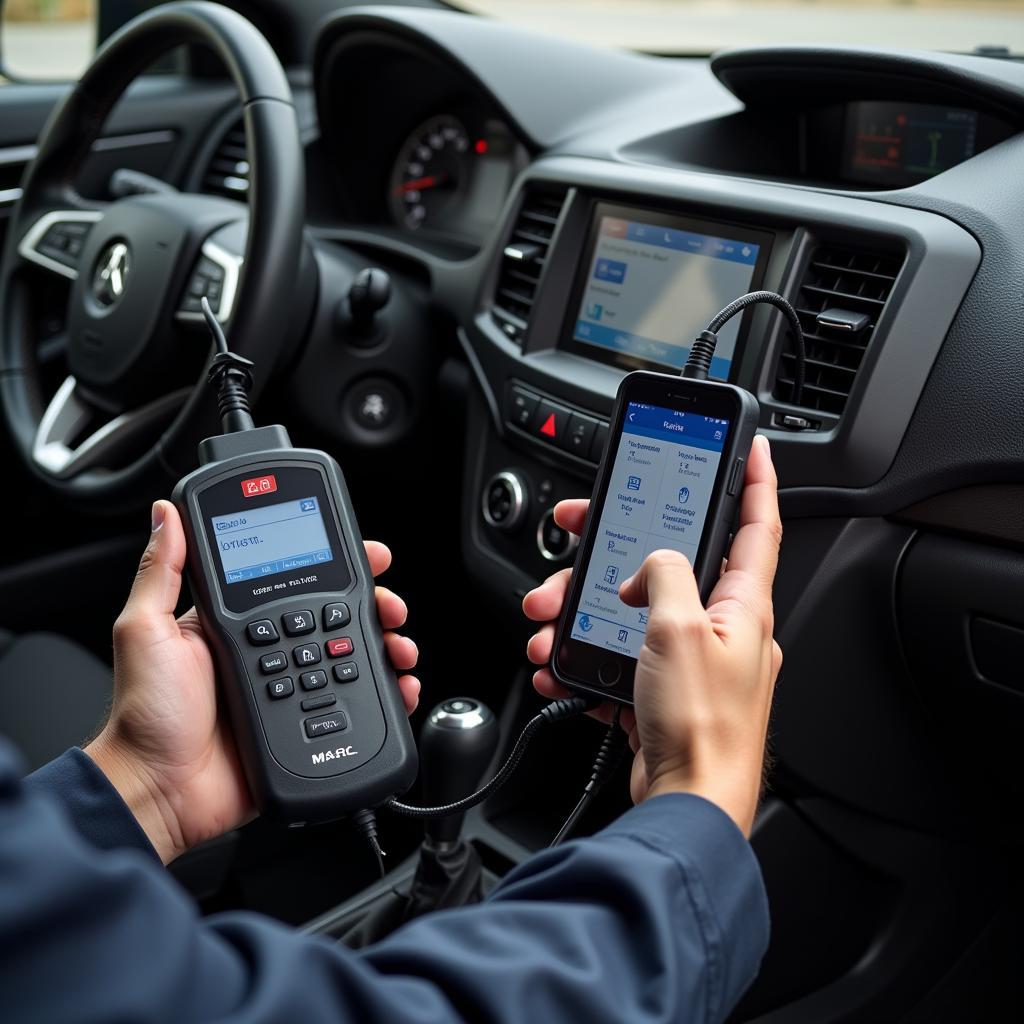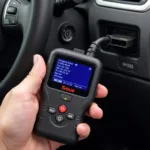Getting a diagnostics check on your car is a crucial part of responsible car ownership. Whether you’re experiencing car troubles or simply want to stay ahead of potential issues, understanding what a diagnostics check entails and when to get one can save you time, money, and stress in the long run.
What is a Diagnostics Check on a Car?
A car diagnostics check is essentially a health checkup for your vehicle. It involves using a specialized tool, known as a car diagnostic scanner, to communicate with your car’s computer system. This system, also known as the Engine Control Unit (ECU), continuously monitors various sensors placed throughout your car. These sensors collect data on everything from engine performance and emissions to airbag systems and braking.
When a problem arises, the ECU stores a specific code corresponding to the issue. The diagnostics scanner retrieves these codes, providing valuable insight into the nature of the problem. This information helps mechanics pinpoint the root cause of the issue, facilitating quicker and more accurate repairs.
Why are Car Diagnostics Important?
Imagine this: your car suddenly starts sputtering, the check engine light stubbornly refuses to turn off, or your fuel efficiency takes a nosedive. These are all scenarios where a car diagnostics check can be incredibly beneficial. Here’s why:
- Early Detection: Diagnostics checks can identify problems in their early stages, often before they escalate into major (and expensive!) repairs.
- Accurate Diagnosis: By providing concrete data, diagnostics minimize guesswork, leading to more accurate repairs and saving you from unnecessary replacements.
- Increased Safety: Diagnostics can identify issues related to critical safety systems, such as brakes, airbags, and stability control, ensuring your car remains safe to drive.
- Improved Performance: Addressing issues highlighted by diagnostics can optimize your car’s performance, leading to better fuel efficiency, smoother handling, and overall improved driving experience.
When Should You Get a Diagnostics Check?
While regular maintenance checks often include basic diagnostics, certain situations warrant a dedicated diagnostics check. These include:
- Illuminated Warning Lights: Any time a warning light on your dashboard illuminates, particularly the check engine light, it’s crucial to get a diagnostics check immediately.
- Unusual Noises or Smells: Unexplained noises like grinding, clicking, or screeching, along with unusual smells, could indicate underlying mechanical issues.
- Performance Problems: Experiencing reduced fuel efficiency, sluggish acceleration, stalling, or difficulty starting your car are all signs of potential problems best addressed through a diagnostics check.
- Before Buying a Used Car: A pre-purchase diagnostics check can reveal hidden problems and help you make an informed decision about your purchase.
What to Expect During a Diagnostics Check
A typical diagnostics check is a straightforward process:
- Connecting the Scanner: A mechanic will connect the diagnostics scanner to your car’s OBD-II port, typically located under the dashboard on the driver’s side.
- Retrieving Codes: The scanner retrieves stored trouble codes from your car’s ECU.
- Interpreting Codes: The mechanic interprets the codes, translating them into understandable diagnoses.
- Further Inspection: Depending on the codes, the mechanic might need to perform a visual inspection or conduct further tests to confirm the issue.
- Recommendations and Repairs: Based on the diagnosis, the mechanic will recommend necessary repairs and provide you with a cost estimate.
DIY vs. Professional Diagnostics Checks
While affordable DIY car diagnostic scanners are available, they might not provide the same level of detail or accuracy as professional-grade equipment. Moreover, interpreting the codes and diagnosing the actual problem often requires mechanical expertise.
Here’s a simple breakdown:
DIY Diagnostics:
- Pros: Affordable, convenient for simple code reading.
- Cons: Limited functionality, might not detect all issues, requires knowledge to interpret codes accurately.
Professional Diagnostics:
- Pros: Accurate diagnosis, comprehensive analysis, expert interpretation and repair recommendations.
- Cons: Can be more expensive than DIY options.
Choosing the Right Car Diagnostics Service
When selecting a diagnostics service, consider the following factors:
- Experience and Expertise: Look for mechanics or service centers with experience in diagnosing and repairing your car’s make and model.
- Equipment and Technology: Ensure the service center utilizes up-to-date diagnostics equipment and software.
- Reputation and Reviews: Check online reviews and ratings to gauge customer satisfaction and the service center’s reputation.
- Transparency and Communication: Choose a service center that clearly explains the diagnostics process, findings, and recommended repairs.
Diagnostics Check on Car: A Smart Investment
In conclusion, regular diagnostics checks on your car are a smart investment in its longevity, performance, and your safety. By understanding what a diagnostics check entails, when to get one, and the benefits of choosing a reputable service, you can enjoy peace of mind and keep your car running smoothly for years to come.
Frequently Asked Questions about Car Diagnostics Checks:
1. How much does a diagnostics check on a car cost?
The cost can vary depending on your location and the service center you choose. Basic diagnostics checks can range from diagnostic car test cost, while more comprehensive diagnostics can cost more.
2. Can I drive my car with the check engine light on?
While you might be able to drive for a short period, it’s crucial to get your car checked as soon as possible. Ignoring the check engine light can lead to further damage and more expensive repairs down the line.
3. Will a diagnostics check clear my check engine light?
Yes, a diagnostics check can identify and potentially clear the underlying issue causing the check engine light to illuminate. However, simply clearing the code without addressing the root cause will only provide a temporary fix.
4. Do I need a diagnostics check if my car is running fine?
Even if your car seems to be running without problems, regular diagnostics checks, particularly as part of scheduled maintenance, can help detect potential issues before they become major problems.
5. Can I perform a diagnostics check myself?
Yes, affordable diagnostic car device are available for purchase. However, keep in mind that professional-grade equipment and expert interpretation often provide a more accurate and comprehensive diagnosis.
Need help with car diagnostics? Contact us via WhatsApp: +1(641)206-8880, Email: cardiagtechworkshop@gmail.com. Our team is available 24/7 to assist you.


